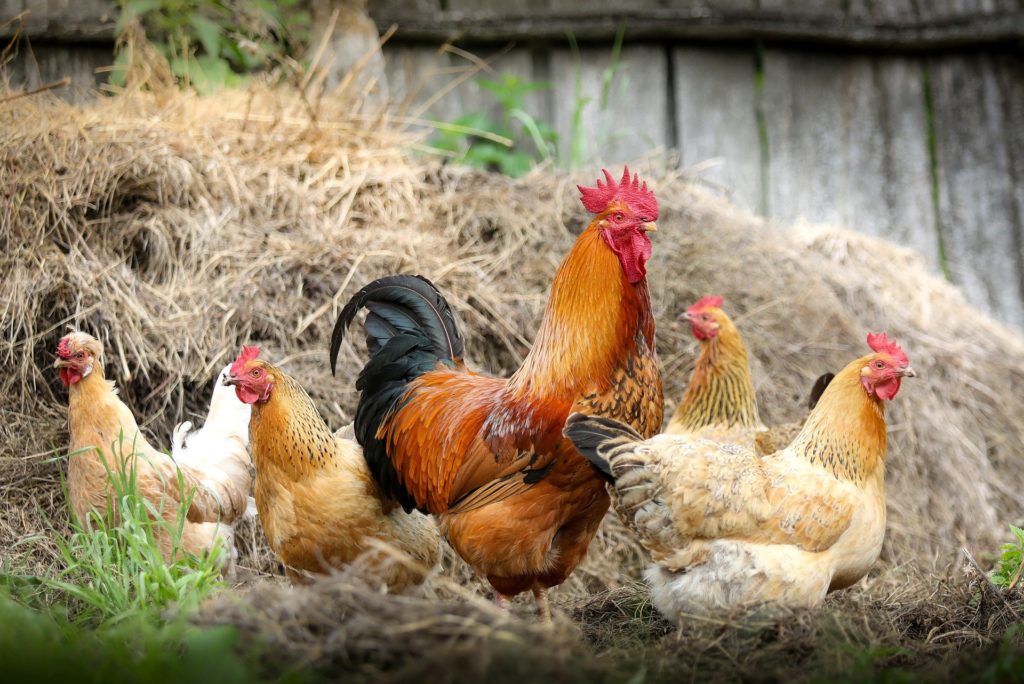BIOSECURITY FOR POULTRY – KEEPING YOUR FLOCK HEALTHY
From Dr. Lew Strickland, UT Extension Veterinarian
Keep Your Distance Restrict access to your property and your birds. Consider fencing off the area where you keep your birds and make a barrier area if possible. Allow only people who take care of your birds to come into contact with them. If visitors have birds of their own, do not let them near your birds. Game birds and migratory waterfowl should not have contact with your flock because they are carriers of Avian Influenza.
Keep It Clean Wear clean clothes, scrub your shoes with disinfectant, and wash your hands thoroughly before entering your bird area. Clean cages and change food and water daily. Clean and disinfect equipment that comes in contact with your birds or their droppings, including cages and tools. Remove manure before disinfecting. Properly dispose of dead birds.
Don’t Haul Disease Home If you have been near other birds or bird owners, such as at a feed store, clean and disinfect car and truck tires, poultry cages, and equipment before going home. Have your birds been to a fair or exhibition? Keep them separated from the rest of your flock for at least 2 weeks after the event. New birds should be kept separate from your flock for at least 30 days.
Don’t Borrow Disease from Your Neighbor Do not share lawn and garden equipment, tools, or poultry supplies with your neighbors or other bird owners. If you do bring these items home, clean and disinfect them before they reach your property.
Early detection is important to prevent the spread of disease.
Know the Warning Signs of Infectious Bird Diseases.
- Sudden increase in bird deaths in your flock
- Sneezing, gasping for air, coughing, and nasal discharge
- Watery and green diarrhea
- Lack of energy and poor appetite
- Drop in egg production or soft- or thin-shelled misshapen eggs
- Swelling around the eyes, neck, and head
- Purple discoloration of the wattles, combs, and legs (AI)
- Tremors, drooping wings, circling, twisting of the head and neck, or lack of movement
**NOTICE**
Report Sick Birds
Don’t wait. If your birds are sick or dying, call your local cooperative extension office (Bedford County 931-684-5971), your local veterinarian, the State Veterinarian, or U.S. Department of Agriculture (USDA) Veterinary Services office to make a report. Contract growers with any of the poultry companies should contact their field representative or production manager immediately.
The Tennessee State Veterinarian is Dr. Smantha Beaty and her office can be reached at 615-837-5120. Also, the USDA operates a toll-free hotline (1–866–536–7593) with veterinarians to help you. There is no charge for this service.
HOWEVER, DO NOT MOVE THE BIRDS FROM THE PREMISES TO AVOID ANY POSSIBLE SPREADING OF ANY DISEASE, INCLUDING THE HIGHLY PATHOGENIC AVIAN INFLUENZA.
NOTIFICATION OR ALERT TO THE STATE VETERINARIAN
WILL ENABLE PROPER OFFICIALS TO RESPOND TO EXAMINE THE BIRDS ON SITE.
Making biosecurity a part of your daily routine while caring for your birds can decrease the chance of AI showing up on your doorstep. If you have any questions please feel to contact John Teague at 931-684-5971 or the officers listed above.
Contact Information
John Teague
Extension Agent and County Director, Agriculture
Phone: 931-684-5971
Email: jteague1@utk.edu
Kevin Ferguson
Extension Area Specialist
Email: kferguso@utk.edu

Resources
- Backyard Chicken Basics – Univ. of Minnesota
- Basic Guide for the Backyard Chicken Flock – Univ. of Florida
- Egg University Handbook on Egg Safety – Univ. of Tennessee
- Factors Affecting Egg Production – Univ. of Florida
- Poultry Resources – Penn State Univ.
- Keeping Garden Chickens – North Carolina State Univ.
- Incubating and Hatching Eggs – Texas A&M Univ.
- Care and Incubation of Hatching Eggs – Mississippi State Univ.
- Hatching Duck Eggs – Cornell Univ.
- Hatching and Brooding Chicks – Univ. of Minnesota
- Care of Baby Chicks – Univ. of Florida
- Intestinal Parasites in Backyard Chicken Flocks
- Prevention and Control of Fowl Pox
- Small Scale Poultry Housing – Virginia Tech University
- Housing Backyard Chickens – Univ. of Utah
Resources for Commercial Poultry Operators
- On-Farm Composting of Poultry Litter – Univ. of Tennessee
- Treating Broiler Litter with Alum – Univ. of Tennessee
- Management of Nipple Watering Systems for Broilers – Univ. of Tennessee
- Biosecurity: Who Is Responsible? – Univ. of Tennessee
- Site Selection Factors for New Poultry Facilities – Univ. of Tennessee
- Permit Requirements for the Poultry Industry – Univ. of Tennessee
- Poultry Litter: Sampling and Testing – Univ. of Tennessee
- Guidelines for Developing and Implementing a Poultry Nutrient Management Plan – Univ. of Tennessee